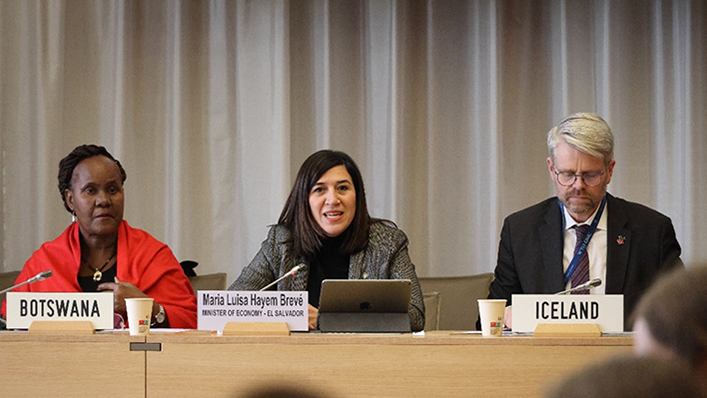
“The gap in economic opportunities continues to broaden and this hampers the potential for economic growth in our countries,” said Ms Hayem Brevé to members of the Informal Working Group. She called on all stakeholders involved in gender equality issues to work together, stressing that “government officials, bilateral donors and multilateral banks need to work in a coordinated manner”.
Ms Hayem Brevé said that the work of the Informal Working Group plays an essential role in helping participants better understand the barriers faced by female traders and the available solutions. She welcomed the inclusion of gender equality issues in the multilateral agenda. “At the 12th Ministerial Conference, we reached an important milestone of including language which recognizes the importance of women’s participation in global trade and the work that multilateral organizations need to carry out in this respect,” she noted.
Ms Hayem Brevé said El Salvador’s National Equality Plan for 2021-2025 provides guidelines for government policy and a strategy for achieving equality and fighting discrimination. The Ministry of the Economy and other bodies have started implementing the Salvadoran Technical Standard for a Gender Equality Management System in the workplace, with the aim of mainstreaming the gender perspective in businesses, civil society and government, she stressed. Furthermore, El Salvador has launched the National Trade Facilitation Strategy 2023-2027 to promote the integration of women and micro, small and medium-sized enterprises in foreign trade, she added.
Members’ presentations
Australia reported on discussions at the “Technical Workshop on Gender Perspectives in Development Programming in the Pacific” held on 21 March, which focused on e-commerce and trade facilitation development programmes in the Pacific region.
Without tailored interventions, trade-related measures can significantly disadvantage female traders, the workshop highlighted. It also emphasized the need for a gender-inclusive approach for development programmes, which should incorporate training on gender issues – including for men – and monitoring of projects from a gender perspective.
The European Union reported on the work conducted jointly with the International Trade Centre on developing a “gender lens” framework for the WTO. Four workshops were organized in 2022 in collaboration with Ecuador, Chile and the United States, focusing on government procurement, e-commerce trade facilitation and investment facilitation.
The European Union said the project’s outcomes could feed into workshops or other events with stakeholders, such as the private sector, civil society and other international organizations. Many webinars have underscored the importance and complementarity of public policies in extending digital access to rural areas, improving access to financial services, and providing training and capacity building to help women-led businesses, the EU noted. It also highlighted the importance of improving data collection, educational policies and other measures.
Update from the WTO Secretariat
Anoush der Boghossian, Head of the WTO’s Trade and Gender Unit, updated members on the Secretariat’s trade and gender capacity-building programme for government officials. Applications for the course increased by 36% between 2022 and 2023, she said. Additional training courses will be organized to meet the demand.
The Youth Trade Summit on Gender, organized by the Secretariat and the WTO Gender Research Hub, will take place on 13-14 November 2023 at the WTO. As a follow-up to the World Trade Congress on Gender, the Summit aims at developing the next generation of trade and gender experts and researchers. “The summit will provide a unique opportunity for youth to exchange views on topical trade and gender issues, and to network and engage with global stakeholders, WTO members and senior researchers in the field,” said Ms der Boghossian.
Share
Reach us to explore global export and import deals